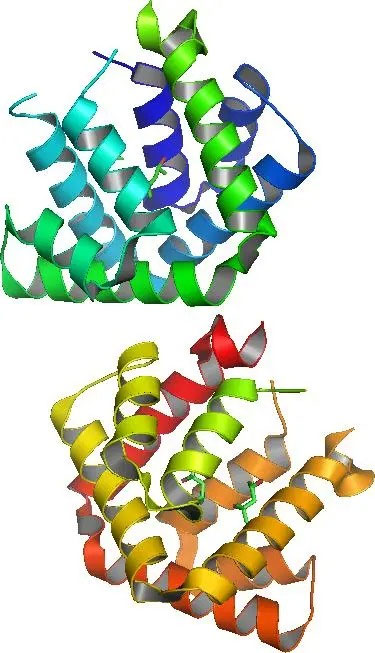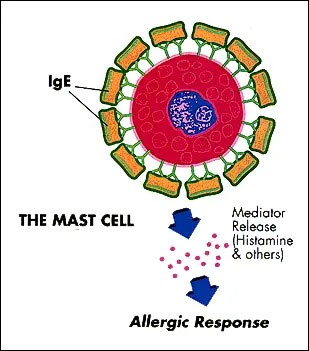If a person is allergic to cats, are they also allergic to lions?
This is a very serious question - if one day a person allergic to cats goes to a wildlife park and wants to get up close and personal with a lion, should he worry about being allergic? Responding to lions?
Most people think that cat dander causes allergies in humans. The reason people think so is probably because when cat hairs fly near the nostrils, it will make you feel itchy and want to sneeze, which is similar to the symptoms of allergies.
But strictly speaking, cat allergies are not caused by cat hair itself. The main culprits that cause allergies are: Fel d 1 and Fel d 4. These are two proteins in cats, here called allergenic proteins . Although there are other potential cat allergens, such as dust, dust mites, etc., allergenic proteins are the main allergen that causes some people to be allergic to cats.

Fel d 1 peptide chain structure in cat saliva.
Fel d 1 is mainly derived from the sebaceous glands, salivary glands and fur of cats , while Fel d 4 is mainly secreted from the submandibular gland . As we know, cats like to lick themselves. When licking, they will simultaneously stimulate the salivary and sebaceous glands to produce Fel d 1 and Fel d 4. After the saliva dries, this allergenic protein will remain in the cat's body.
If you are unlucky enough to be allergic, when exposed to an environment with cats (because cat hair will fly into the air, you will be exposed as long as you are near the cat, even if you do not touch the cat). ), your immune system will attack these harmless proteins. Specifically, when substances containing allergenic proteins come into contact with your skin or mucous membranes and enter the body, immune cells react and secrete IgE and IgG antibodies , leading to the degeneration of mast cells or eosinophils in immune cells (i.e., mast cells or basophils).

Sensitization process.
Degeneration causes mast cells or basophils to release a variety of chemicals, including more than 30 different allergenic chemicals. The most famous is histamine, which causes itching when released into the skin, wheezing when released into the lungs, a drop in blood pressure when released throughout the body and finally causes an inflammatory reaction called allergies. Allergies happen very quickly and are also called immediate reactions. Allergy symptoms are very uncomfortable, such as swelling, flushing, runny nose, and watery eyes.
How can people with allergies keep cats?
In fact, female cats secrete less allergenic proteins than male cats , but if the cat is neutered, the amount of allergenic proteins it produces will be similar to a female cat. So the researchers estimate that the production of these proteins is related to the cat's sex hormones.
So are there any breeds of cats that produce lower than normal amounts of allergenic proteins?
It is true that there are such individual cats, also known as hypoallergenic cats , but they are just individual cats. Researchers have investigated different cat breeds and found that some cat breeds produce significantly lower amounts of allergenic proteins than other cat breeds. For example, some naturally bred Siberian cats from the Siberian region have genetic variations that result in lower levels of allergenic proteins.
Although some cats produce lower amounts of allergenic proteins, even the smallest amounts are enough to cause allergy symptoms in susceptible people.

Animal allergies can cause symptoms ranging from mild to severe , including itching, sneezing, runny nose, watery eyes, rashes, swelling, difficulty breathing, and even asthma. In severe cases, animal allergies can lead to a life-threatening reaction called anaphylaxis.
Since one cannot pet a cat due to allergies, what about petting other big cats? Can they also have allergies?
In fact, there have only been three recorded cases of people being allergic to lions and not being eaten by lions. Of course, the people who come into contact with such ferocious big cats are extraordinary people, either hunters or keepers. These data are not representative and cannot explain the problem.

Cats and lions are both cats, and they share some of the same allergenic proteins. This protein is found in their saliva, skin and urine. If a person is allergic to one of these proteins, they may have an allergic reaction when exposed to any cat species, including lions. However, the degree of allergy may vary from person to person. Some people may be mildly allergic to cats but not allergic to lions, and vice versa.
So, a medical doctor from the Netherlands went to the Amsterdam Zoo, collected hair from various big cats during winter grooming, and studied it. The origins of these hairs include pumas, Siberian tigers, lions, jaguars, snow leopards, etc. Scientists used a chemical extraction method to obtain the extract. Then, the research team found six people who were allergic to cats and extracted their serum.
Scientists discovered after testing that people who are allergic to cat fur are also allergic to big cats but to a lesser extent.
So, if you are allergic to cats, you may experience mild allergy symptoms when you come into close contact with lions .
- 9 truths 'cause sock' dedicated to cat lovers
- Tiny wild cat resilient to female lion lions
- Dog breeding tiger lion
- The 'strange' cats in the world
- Allergic rhinitis: Causes, symptoms and treatment
- Hypoallergenic cats are released to the market
- Video: A close-up of the horrifying battle of lions
- 5 ways to prevent allergic rhinitis when changing seasons
- An animal list has a unique sound
- Crocodiles are torn by lions because they dare to loot their lures
- Not only rhinos and tigers, African lions will soon disappear
- How to prevent cold-season allergic rhinitis
 Animal 'suffering' after hibernation
Animal 'suffering' after hibernation Why do goats climb well?
Why do goats climb well? Scientists were surprised to see chimpanzees eating turtles
Scientists were surprised to see chimpanzees eating turtles Giant catfish died deadly due to drought in Thailand
Giant catfish died deadly due to drought in Thailand The most famous real cats in human history
The most famous real cats in human history  3 Cat Breeds Veterinarians Advise to Avoid
3 Cat Breeds Veterinarians Advise to Avoid  Why are calico cats always female?
Why are calico cats always female?  Scientific discovery may solve 10,000-year-old mystery inside calico cat's fur
Scientific discovery may solve 10,000-year-old mystery inside calico cat's fur  Are orange cats as 'scandalous' as rumored?
Are orange cats as 'scandalous' as rumored?  Did you know: Are hyenas dogs or cats?
Did you know: Are hyenas dogs or cats? 